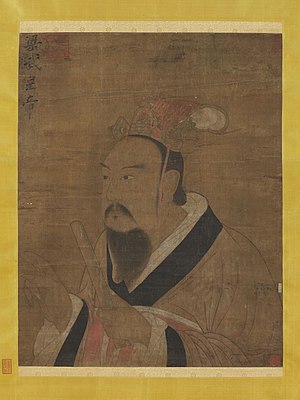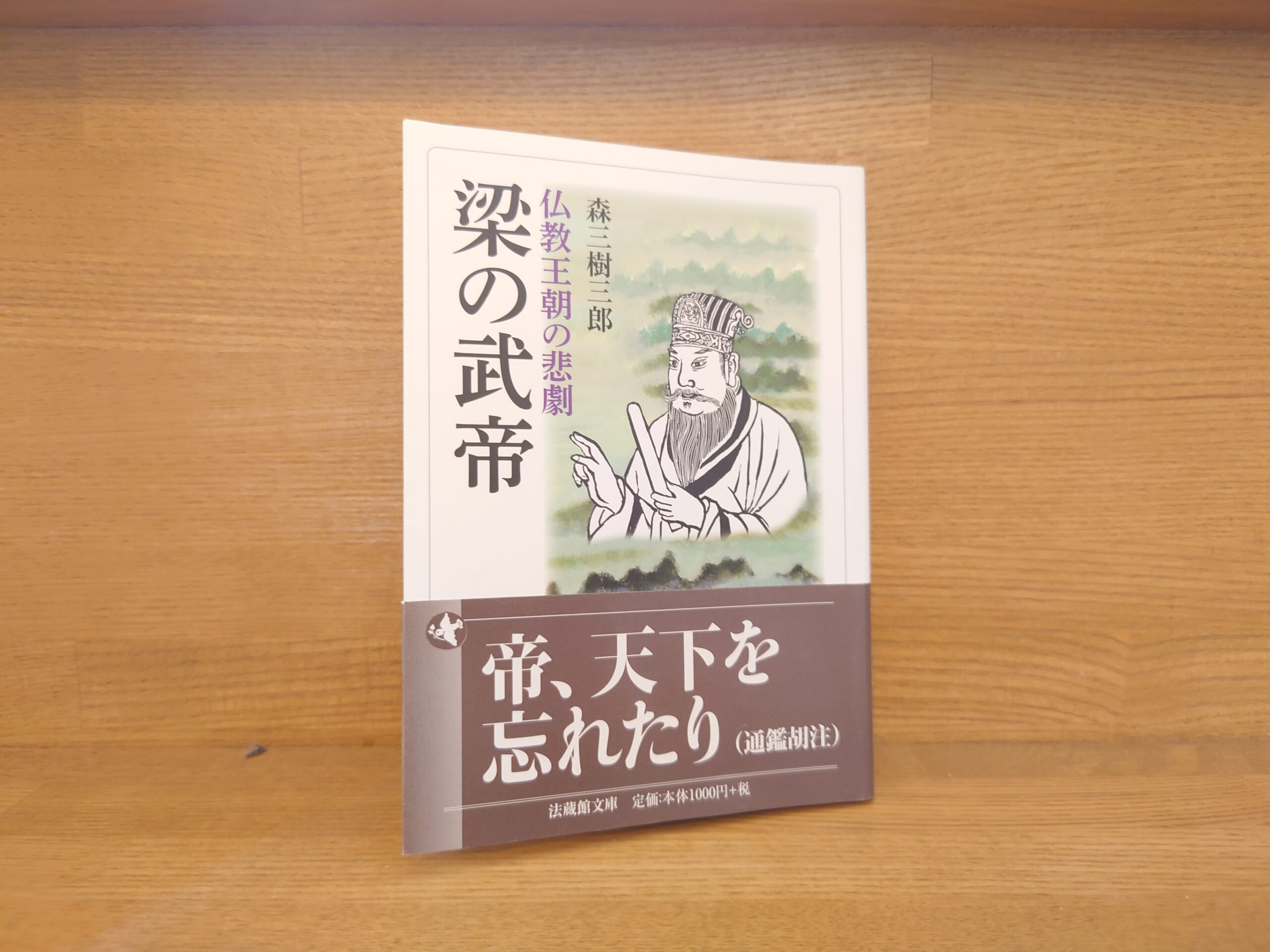MIKUSABURO MORI'S "The Wu Emperor of Liang: Tragedy of a Buddhist Dynasty" Summary and Comments - Recommended to learn about the good government of a Chinese king who was a Buddhist believer and his tragedy! And the connection with Cloudy Lan.
I would like to introduce a book entitled "The Wu Emperor of Liang: Tragedy of the Buddhist Dynasty" written by Miki Miki, published by Hozokan in 2021.
Let's take a quick look at the book.
Emperor Wu, who was called "Emperor Bodhisattva" and was a devout believer in Buddhism, died of starvation while in confinement after Houjing's invasion. Was it really a tragedy caused by Buddhism? This is a masterpiece that depicts the spirit of the warrior-taishu in the Six Dynasties period. Long-awaited paperback edition.
AmazonProducts Page.

This book is a biography of a king in the country of Liang, China, from the early to mid-6th century. The commentary at the end of the book states the following about the book.
This book is a masterpiece that should be recommended not only to introductory students who are about to study the political, cultural, and religious history of China's Northern and Southern dynasties, but also to those who, after having studied them all, wish to attempt to understand the characteristics of Liang's Wu emperor within the larger framework of the history of ideas and culture. (omitted)
Although the title of this book gives the impression that it focuses exclusively on the Wu emperor of Liang, this is not the case. As one reading of the book reveals, it unravels the characteristics of the Wu emperor of Liang while outlining the politics and culture of the six dynasties of medieval China (the three states connecting the Later Han Dynasty and the Sui Dynasty: Wu, Eastern Jin, Song, Qi, Liang, and Chen) in a prospective manner. It is a fine work that weaves together a broad framework of warp and dense weft. The warp is a general historical account that focuses on political developments from the Later Han to Liang Chen and the "history of Xuan Confucian literature," which consists of Confucian studies, Xuan studies (Laozhuang), literature, and history. The weft, on the other hand, is an in-depth analysis of individuals, especially the Wu emperor, his writings, and his words and deeds, in accordance with the literature. As a result, the book succeeds in portraying the personality of the Wu emperor while placing him in the larger context of his time.
Hozokan, Mori Mikisaburo, The Wu Emperor of Liang: Tragedy of the Buddhist Dynasty, p. 209-210.
As mentioned here, this book is not simply a look at the Liang Wu Emperor alone, but a look at China at that time from a larger perspective. Emperor Liang Wu was a remarkable man who was a great believer in Buddhism, and it is fascinating to see the background of his life and how he met his end.
The author also has the following to say about this book and the Liangwu Emperor
Emperor Wu of Liang was a famous Buddhist devotee whose devotion to Buddhism was so great that he was even said to have brought about the death of his country. While he was revered by Buddhists as an imperial bodhisattva, he was also harshly criticized by those who did not favor Buddhism. This fact alone may be enough to make the Wu emperor of Liang a figure of historical interest. However, it is not necessarily out of an interest in such an episodic incident that I am concerned here with the Wu emperor of Liang, but rather from a broader historical perspective. (omitted)
One intention of this essay is to look beyond such chronological and historical issues in the hope of determining the relationship of Buddhism in general to the real world. As is well known, the Wu emperor of Liang was so devoted to Buddhism that he had a long-held desire to establish a Buddhist state. Unfortunately, the Liang dynasty was doomed to destruction by the invasion of a barbarian general named Hou Jing, and the Wu emperor himself is said to have died of starvation while imprisoned in a room. Was this tragic fate of the exiled country the result of a faith in Buddhism, as the ex-Buddhists claim? If this is true, then we must accept the criticism that Buddhism is a religion in exile. Or does this indicate that religion in general, and not only Buddhism, is inadequate as a guiding principle for a real nation? If so, it is a fact that what belongs to God must be attributed to God and what belongs to Kaiser must be attributed to Kaiser, not only from the standpoint of a religious person, but also from that of a politician. Are religion and politics, eternity and reality, finally parallel lines that cannot be crossed? Even if it is not hoped that such a big problem can be solved by this essay, if we can at least present where the problem lies, we will have accomplished our mission.
Hozokan, Mori Mikisaburo, The Wu Emperor of Liang: Tragedy of the Buddhist Dynasty, p. 7-9.
As told here, this book will take a closer look at the political and religious affairs of Emperor Liang Wu. The Wu Emperor had a good government that was unthinkable at the time. The Wu emperor's Buddhist line of peaceful culture clearly enriched people's lives. But what a sad irony that the good government itself was the cause of the country's collapse.
In this book, we will take a closer look at the good government of such a warrior emperor and the collapse of his nation. As you can see in the quote above, the destruction of the country is very sad. Although the Wu emperor himself was not without his own shortcomings and blunders, it is still tempting to imagine what history might have been like.
In addition, the main character in this work, Liang's Wuji, is actually a very deep connection for Jodo Shinshu.
In Shinran's "Shoshin chants," which are treasured by Jodo Shinshu, there is a verse that reads, "Hon Shi Gyunran Liang Tianzi Jyoko Xiangran Sho Bodhisattva Rites. This verse implies that "Liang Tianzhi (the Emperor of Liang) always treated Cloudyran as a Bodhisattva. This passage is referring to the fact that Cloudy Lan, one of the seven high priests highly valued by Jodo Shinshu, was also respected by the king of China.
The character for "lran" in Shinran comes from this cloudy lran. Shinran himself considered Cloudyran to be a very important figure in his life, and the fact that he goes to the trouble of mentioning the name of Emperor Liangmu in a passage about such an important person cannot be overlooked. It must have been very moving for Shinran to hear that the Liangmu Emperor had always respected and admired him.
I think it is significant to learn about this Liangwu Emperor when thinking about Shinran and Jodo Shinshu.
It is a very interesting work as a book. Miki Miki Mori's writings have been previously published inMIKUSABURO MORI, "Laozhuang and Buddhism" - An exciting book to learn about the relationship between Laozhuang and the reception of Buddhism in China!article, but it is a classic book that cannot be mistaken anymore. Mr. Miki Miki Miki's stimulating commentary is still alive and well in this book. I highly recommend this book.
The above is "MIKUSABURO MORI, "The Wu Emperor of Liang: Tragedy of a Buddhist Dynasty" - Recommended to learn about the good government of a Chinese king who was a Buddhist believer and his tragedy! It also has a connection with Cloudy Lan".
Next Article.
Click here to read the previous article.
Related Articles





































